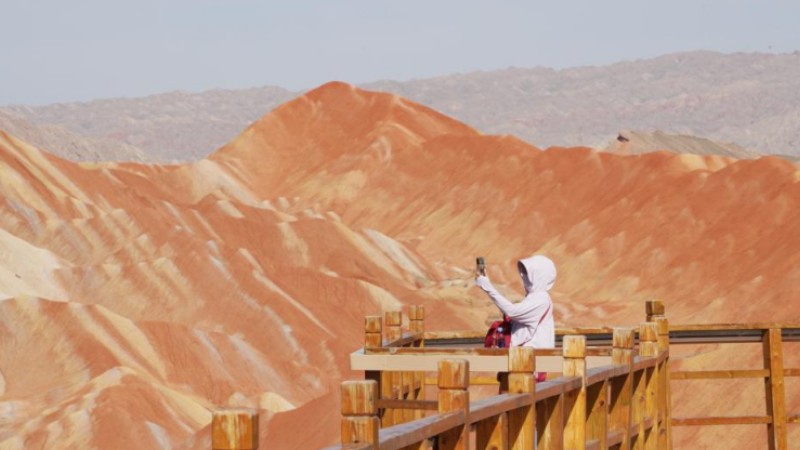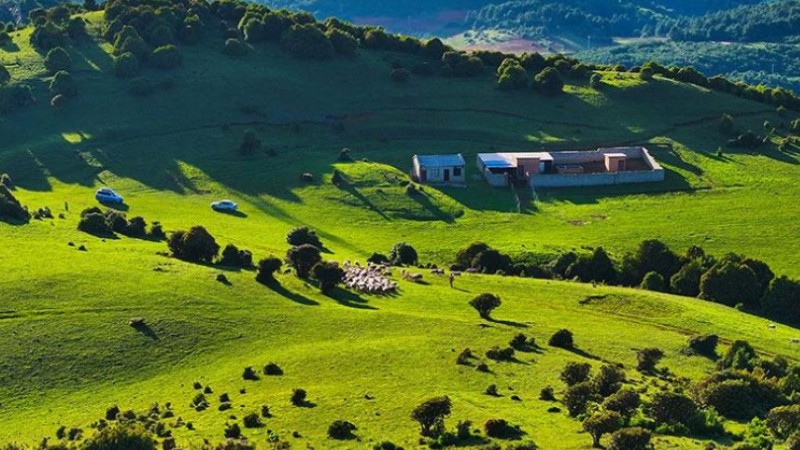Tibet Story: Concerted efforts turn "forgotten village" into memorable ecotourism hub
LHASA, Aug. 10 (Xinhua) -- Sonam Palden is with an axe again almost 50 years after he quit his job as a lumberjack. But this time, it is for the better protection of the forest.
"Some trees have grown so thick that they affect the growth of shorter plants, and some even hinder the visibility of drivers," said the 70-year-old, who hails from Gyerba Village in the city of Nyingchi, southwest China's Tibet Autonomous Region.
Nyingchi has one of the largest original forest areas in China, with a forest coverage rate of 47.6 percent. In the past, the locals relied on forests and engaged in tree felling across generations to earn a living.
"People had to depend on cutting trees to make money, even the local government's revenue depended heavily on logging. The trees lining the roads had nearly disappeared, posing potential risks of debris flows," said Sonam Palden, who transitioned into the role of a forest ranger in 1976.
However, shifting from the role of a logger to that of a ranger was not easy. "During the day, we would hold a village meeting to reiterate the logging ban, yet some people would go and cut down trees stealthily at night," he said. "One time when we were patrolling, a truck loaded with lumber ran into us and wrecked our car."
According to him, the reason behind the resistance of villagers at that time was mainly because the ban on logging reduced their income.
To protect Nyingchi as an important ecological safety barrier, the local government ramped up efforts to implement the ban on logging while promoting ecotourism to help increase people's income.
"Gyerba" means "forgotten" in the Tibetan language. Nestled at the foot of snow-capped mountains beside Basum Lake, the village has emerged from obscurity and gained prominence among tourists thanks to the development of ecotourism.
Speaking about the old days, Sonam Palden said that during his childhood, the village lacked roads, and every step he took turned into a muddy ordeal when summer rains arrived. But today the village boasts asphalt-paved streets, and cement roads provide access to every household.
After the launch of a housing renovation project in 2005, more than 120 families in the village moved into spacious and bright new homes. Today, the village has access to electricity, running water and internet coverage, with the most noticeable changes happening in the past 10 years, according to Sonam Palden.
He said he is very pleased to see that the villagers now not only have a greater sense of environmental awareness, but they have also undergone a transformation in their way of living.
"In the past, people in the village went up the mountain to cut down trees, and would return home only to drink and horse around. Now they are competing to make money out of tourism," he said.
Dawa Droma's family started the first homestay in the village in 2002. The homestay, named "Holy Lake," was renovated in 2021, after Dawa Droma sensed a business opportunity and chose to return to her hometown to run the homestay.
"Instead of leaving my hometown to work outside, I've become my own boss at home," she said.
The clean and tidy rooms, the unique Tibetan decorations, and the beautiful environment beside the lake and snow mountains have brought her a steady stream of customers. During the tourist season, the rooms are fully booked almost every day.
Besides, she also runs a Tibetan restaurant on the first floor of the homestay, where visitors can taste local specialties and buy ethnic handicrafts.
In 2018, the local government rolled out supporting measures to encourage the villagers to build boutique homestays. Every resident had the opportunity to apply for a loan of 1 million yuan (about 140,000 U.S. dollars). In addition, the county government offered an award of 100,000 yuan per homestay.
At present, the village has 48 homestays and family inns, and they generated about 2.5 million yuan in tourism revenue in the first half of 2023.
"Environmental protection has brought an increasing number of tourists, and the business environment has continued to improve," Sonam Palden said, adding that currently there are 26 forest rangers in the village, and a reforestation program has been carried out every year since 2003.
Photos
Related Stories
Copyright © 2023 People's Daily Online. All Rights Reserved.









